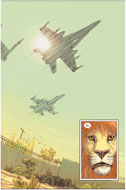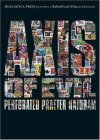march  2008
2008
PBS' Frontline has the best "official" video site for watching shows online of any TV show or network. Each episode is cut into six or more parts and the amount of time between new episodes being posted is completely random but these are happily bearable due to the complete lack of advertising and the smooth, nearly-full screen streaming video quality.
Right now, they have this quiz as an "extra" to a recent episode that was taken straight from the test given to "Kilo Company" (some division in the military) before they deployed on their now-infamous, disastrous mission to Haditha. The questions get progressively harder but I was thinking my answers were all pretty reasonable so I was kind of shocked to discover that I had only answered 10 out of 19 correctly. I don't feel so bad, though — my answers might have been less likely to result in a criminal investigation and the deaths of 24 civilians. Find out how well you know, or can guess, the Rules of Engagement.
 Speaking of battles, I found an amazing documentary online which came out in 2006 called Battle of Chernobyl. I remember when I first started getting videos from the library, looking for anything I could find on Chernobyl and being seriously annoyed that there only seemed to be one or two low budget black and white videos that were obviously produced shortly after the event without any kind of security clearance to actually film the area or interview relevant people.
Speaking of battles, I found an amazing documentary online which came out in 2006 called Battle of Chernobyl. I remember when I first started getting videos from the library, looking for anything I could find on Chernobyl and being seriously annoyed that there only seemed to be one or two low budget black and white videos that were obviously produced shortly after the event without any kind of security clearance to actually film the area or interview relevant people.
Faced with this complete void of information, I eventually accepted/assumed that the event must not have been documented in the way that spectacular disasters are here in the west. Compared to the Challenger explosion, which happened the same year, we had almost nothing on the world's biggest nuclear disaster — no interviews, no eyewitnesses, no video (of course) — just a tiny, grainy-ass picture of the reactor which was so small you strained your eyes to make out the lurid details you knew should be there and used your imagination to fill in the rest.
It looked as though the former Soviet government, well-known for its secrecy, had successfully prevented any comprehensive history of the event from emerging and being subject to the scrutiny of the world. Until recently, anyway.
"Based on top-secret government documents that came to light only in the Nineties, during the collapse of the Soviet Union, THE BATTLE OF CHERNOBYL reveals a systematic cover-up of the true scope of the disaster, including the possibility of a secondary explosion of the still-smoldering magma, whose radioactive clouds would have rendered Europe uninhabitable. The government effort to prevent such a catastrophe lasted for more than seven months and sacrificed the lives of thousands of soldiers, miners and other workers." [First Run Icarus Films]
Battle of Chernobyl is as thorough and detailed an analysis as you would expect from Frontline and the story is told in incredible, harrowing first-person accounts by military leaders, soldiers, evacuees, firefighters, miners and Gorbachev himself. These stories unfold against a stunning collection of recently-declassified video footage and photographs taken at the time, documenting every aspect of the crisis and revealing the true horror of events that we in the west have only been able to imagine for over 20 years.
So, I was talking to a friend last week at work and she was telling me about her plans to take some time off with her husband and travel down the west coast this summer. It will be part retirement celebration, part bike marathon, part camping adventure in the Rockies and part cross-country road trip while gas is still affordable. I told her it sounded like pure torture to me but that my family did quite a bit of traveling around the time I was born so I can appreciate the sentiment on a deep, genetic level. Although the more vividly memorable road trips of my later youth did nothing to instill in me the familial fondness for traveling — not by Greyhound bus, bicycle or hatchback anyway — I probably harbor some vague nostalgia for those unremembered experiences of my earliest moments spent "on the road."
I asked her if she planned to return to Vancouver at the end of all her travels and she said, yes, it's got the best combination of all the things that make a city livable to be found in Canada. In North America, I corrected her — having lived in a handful of US cities, I know of only one that would easily trump Vancouver — but, I added, there's nothing that could make me want to live there again the way things are now.
She looked at me, unexpectedly serious. "These damned Americans." She shook her head, "I can't believe how badly they've screwed things up..." I nodded, mirroring her seriousness. I wasn't sure if she meant financially, environmentally, karmically or in terms of squandering the good will of the rest of the world but it didn't really matter. The tone of her voice seemed to encompass all those things and more. "I try to tell people, especially young people," she continued, "just enjoy your time... who knows what kind of a future we'll have?"
I agreed, joining her in a quick, cathartic rant as our shared history flashed through my mind — half a dozen conversations over two years, Friday afternoons with plastic cups of wine in our hands, trading political theories and comparing the ideologies of the 60s with those of the 90s — then I hugged her lightly, wishing her luck and good weather.
It was the kind of conversation that usually leaves me in tears, struggling to regain composure and continue about my day as if everything was normal but for some reason, after she walked away, I just sat staring through my computer screen thinking about how it was very possible I might never see her again. Thinking about how that very thought was just like the future no one knows about; an apocalyptic weight that hovers just out of view but so close you fear breathing in too deeply.
In another "thank god I don't have cable" moment, I've been reading enough news online this past week to know that Barack Obama's friend the Reverend Jeremiah Wright has been the main course in the latest television news feeding frenzy. So, all the networks have been dutifully replaying and rehashing the same 8-second sound bites from the Reverend's supposedly "inflammatory" sermons — and, honestly, I think "fiery" is the word they're looking for (I mean, geez, you'd think these media types had never been to a black church service before!).
Well, this morning someone (thank you, Erikka of Brave New Films) saw fit to upload the long version, a 10-minute clip from a sermon given shortly after September 11, 2001. It's also been posted on YouTube along with several others. Now that I've seen it, I am really glad I don't have to watch the corporate network archorpuppets acting out their scripted histrionics and pretending to be all offended in the name of white people.
Speaking of white people... heh. Since the Federal Reserve Bank funded JP Morgan's bailout (/buyout/hostile takeover/whatever it was) of Bear Stearns last week, the story has been reported in varying degrees of detail by all the major news media. I've heard several reporters, perhaps taking a cue from John McCain's pathetically transparent "al-Qaida/not al-Qaida" doublespeak, using "the Federal Reserve Bank" and "the government" interchangeably, which might tend to give people the impression that they are, in fact, interchangeable. They are not. The Federal Reserve Bank (or "Fed") is not a branch of the government. (Remember in school how there were three? There are still only three and "the money" isn't one of them.)
Many news programs have also tried to accompany their stories about the financial markets with something like a "hedge funds for dummies" sidebar to bring their viewers a little closer to at least feeling like they understand what the fuck is going on. Pay no attention; this is all you need to know.
Here's a cool thing I heard right after New Jersey abolished capital punishment last December. Bill Moyers was interviewing a man who was living in Rome and he mentioned that the Colosseum had been illuminated the night before in honor of New Jersey's decision.
 "In recent years [the Colosseum] has become a symbol of the international campaign against capital punishment... As a gesture against the death penalty, the local authorities of Rome change the color of the Colosseum's night time illumination from white to gold whenever a person condemned to the death penalty anywhere in the world gets their sentence commuted or is released or if a jurisdiction abolishes the death penalty." [Wikipedia]
"In recent years [the Colosseum] has become a symbol of the international campaign against capital punishment... As a gesture against the death penalty, the local authorities of Rome change the color of the Colosseum's night time illumination from white to gold whenever a person condemned to the death penalty anywhere in the world gets their sentence commuted or is released or if a jurisdiction abolishes the death penalty." [Wikipedia]
Isn't that amazing? Imagine this symbol, with its (our) long and bloody history — the Colosseum, crowning achievement of the Roman Empire, once notorious for its gladiator games and Christian sacrifices, a monument to human cruelty and a reminder of our capacity for barbarism, now a beacon in the other direction, towards compassion and civilization — a reminder of our capacity for humanity.
It never ceases to amaze me how I continue to discover new sections of the library that I never knew existed before, despite the fact that I'm there a minimum of 1-2 times every week (barring any unpleasantness like last summer's union strike which closed all the city's libraries for three bloody months — not to mention some garbage collectors).
It all started when we lost our cable tv back in 2004 ("lost" here means "were cut off due to inability to pay") and I discovered that the library carries videos and DVDs; documentaries and shows from the BBC, Discovery Channel, History Channel, PBS, etc. etc. So I started working my way through the History section on the 6th floor, blissfully unaware that there were "audio/video" sections located on every floor, sometimes more than one. It actually took me several visits over two months to discover all of them — and, honestly, I wouldn't be all that shocked if I found out tomorrow that there was yet another one hidden somewhere that I'd somehow been overlooking all this time.
Anyway, since 2004 I've gone at least once a week, taking out my quota of DVDs and videos (5 of each) and CD audio books, which are harder to find because there are actually far fewer of them. In the "popular reading library" on the first floor they also have regular movies and television series collections but, as one might imagine, the selection fluctuates a great deal depending on how recently the shelves were restocked. For this reason, the first floor is always my last stop after doing the full circuit from History and Fine Arts on 6 through Technology on 4, then Social Sciences on 3.
Between the "popular reading library" DVDs and the checkout line there's a long aisle created by several shelves of audio books running parallel to a wall with a few open pay phone booths on the other side. I always check the nonfiction audio books on my way out but it was only last month that I actually, purposefully glanced to the left and discovered the library's growing collection of graphic novels. I immediately realized that they've been in this exact location for at least a year, maybe longer, and it was then that it hit me; all this time, I must have been purposefully avoiding glancing to the left as I walked down this aisle. A minimum of 1-2 times every week for a year or more.
Now I know I'm more introspective than observant but this just seems ridiculous. Could it be that I was that paranoid about making eye contact with someone using a pay phone that I subconsciously averted my gaze for the entire length of the aisle, effectively negating any sensory input from my left field of vision? What's that about?!
![]() Anyway, after finding and adoring Pride of Baghdad, I also discovered the recently-released English translation of Persepolis, which was originally released in 2000 in French to unprecedented success and critical acclaim and was subsequently adapted into an Oscar-nominated feature film in 2007.
Anyway, after finding and adoring Pride of Baghdad, I also discovered the recently-released English translation of Persepolis, which was originally released in 2000 in French to unprecedented success and critical acclaim and was subsequently adapted into an Oscar-nominated feature film in 2007.
Last January, The New York Times reported on the book's phenomenal success and its creator and autobiographical lead, Marjane Satrapi.
"Ms. Satrapi said she wrote "Persepolis" as an answer to the relentless and loaded question of what it means to be Iranian. But her book's success has meant that she has both gently educated those in the West — "Persepolis" is taught in 118 colleges in the United States, including West Point, according to Pantheon, its publisher — and taken part in a larger conversation about the book's global resonances."
I can almost hear my mother lamenting the state of the American education system when college students are learning about Middle East history from comic books — and that's obviously not counting the ones who are going off to fight in Iraq first to try to pay for that education. But I think, if these two stories are any example of what can be conveyed in this deceptively simple format, that if American students were required to read just these two books in school, they would graduate with a better understanding of the Middle East than I did.
Which is actually more than a little sad when you consider that I went to a private hippie-intellectual high school that prided itself on incredibly high rates of college acceptance and a student-teacher ratio of 7-1, unheard-of in public schools. Especially since my senior year coincided with Iraq War I — I can remember discussing the war in AP US History class and talking about how evident the media bias was in their coverage of the war but...
Now, it seems to me that the words "AP US History class" kind of paint the whole picture in a nutshell, don't they?
But enough about my educational shortcomings (for now). After all, for an art form that can trace its roots back to ancient Egypt and the Book of Kells, I think the graphic novel is long overdue for the respect and acceptance it's now gaining as a serious medium.

 I picked up an amazing graphic novel at the library last week called Pride of Baghdad (Vertigo Comics, created by writer Brian K. Vaughan and artist Niko Henrichon). It's the story of the early days of the Iraq war told from the perspective of four lions who are "freed" from their captivity at the Baghdad Zoo when the US invasion begins. It's based on a true story.
I picked up an amazing graphic novel at the library last week called Pride of Baghdad (Vertigo Comics, created by writer Brian K. Vaughan and artist Niko Henrichon). It's the story of the early days of the Iraq war told from the perspective of four lions who are "freed" from their captivity at the Baghdad Zoo when the US invasion begins. It's based on a true story.
The artwork is absolutely stunning, from the first breathtaking full page spread (seen here) to the final frame. The story is as gripping and as devastating as any you'll hear on the nightly news.
(Click thumbnails above to see pages 2 and 3 full size.)
Despite the frenzied reporting of every volley exchanged in what is shaping up to be a war of attrition between the two Democratic candidates, the overall level of daily pulse-pounding panic which has come to characterize this campaign seems to have slowed down just a bit since the last primary in Minnesota on March 11.
However, in an election year that promises to surpass anything in recent political history for sheer ridiculousness and wallowing emotional excess, it seems only natural that, just as we entered a month-long pause between primaries, the Clinton and Obama campaigns embarked on their latest round of point-counterpoint attacks which are playing out in the media like a high-stakes game of human chess.
Only Amy Goodman and the rest of the Democracy Now gang, bless their level-headed hearts, have refused to play along, instead devoting hours of coverage to Iraq Veterans Against the War and airing speeches from this week's "Winter Soldier: Iraq and Afghanistan" gathering in Maryland. Highly recommended for anyone who's still trying to rationalize being "for the war" or sporting a "Support the Troops" bumper sticker.
Axis of Evil is an intensely interesting and original documentary by BulletProof Film, Inc. that "deconstructs the rhetoric of the President's catch phrase and illuminates the ways in which our government manipulates truth, language, and the media to hijack popular culture and opinion."
Courtesy of Free Speech TV.
Video: "Message to Nader - We Are Anonymous"
 I'm posting a link to this thing because about 80% of me thinks it's hilarious but with the caveat that I still deeply respect Ralph Nader and think it's perfectly fine and appropriate that he entered the Presidential race when he did, hot on the heels of Edwards and Kucinich dropping out of the race, leaving two Democratic candidates who, while seeming to preach to different choirs, have very nearly identical voting records in Congress.
I'm posting a link to this thing because about 80% of me thinks it's hilarious but with the caveat that I still deeply respect Ralph Nader and think it's perfectly fine and appropriate that he entered the Presidential race when he did, hot on the heels of Edwards and Kucinich dropping out of the race, leaving two Democratic candidates who, while seeming to preach to different choirs, have very nearly identical voting records in Congress.
(You know, this oft-quoted statistic is one that really deserves to be accompanied by some actual numbers with far greater frequency in the media; but after an exhausting (that's right — not exhaustive) search for a comparison of their votes from 2005-2007, I think I understand why they're not quoted more often. Voting records, organized by issue, as well as campaign financing information for all Members of Congress can be found at VoteSmart.org, cited as the source for various summaries I also found online. Unfortunately, however, the cartoonishly simple, side-by-side sidebar I had envisioned isn't as readily available as one might hope.)
Anyway, Ralph Nader is simply, bravely and necessarily acting out the role of "Gadfly," an archetype as old as democracy itself. His predecessor Socrates embodied the role of the Gadfly in Ancient Greece and he defined it in this speech to the Athenian jurors who eventually sentenced him to death:
"For if you put me to death, you will not easily find another, who, to use a rather absurd figure, attaches himself to the city as a gadfly to a horse, which, though large and well bred, is sluggish on account of his size and needs to be aroused by stinging. I think the god fastened me upon the city in some such capacity, and I go about arousing, and urging and reproaching each one of you... But you, perhaps, might be angry, like people awakened from a nap, and might slap me... and easily kill me; then you would pass the rest of your lives in slumber, unless God, in his care for you, should send someone else to sting you." [Plato's Apology]
I can't remember the word for simultaneously holding two contradictory viewpoints. It's probably one of those great German untranslatables like schadenfreude (or schizophrenia) but that's something I've been trying to come to terms with lately as I observe the political psychodrama unfolding to the south.
Take, for example, voting; we know enough about the last two elections (thanks, Greg Palast) to scare us off voting for good, convinced that the whole charade is a waste of time at best (and we don't even want to know what "at worst" looks like). On the other hand, we know that if we don't vote, "they" win by default. "It's harder to rig a landslide election" and all that. More importantly, voting tells "them" that we haven't given up yet (even though we know it's just a game show. Wink, wink).
Hope, cynicism, fear, loathing, disbelief, wanting all the answers, wanting to be left the fuck alone... did I say two contradictory views? This quote is somewhat relevant (but 80% of me just thinks it's hilarious).
James Inman: "I really don't know what to believe anymore. The more I look into what happened on 9-11 the more I see a riddle wrapped up in an enigma fucking a unicorn, inside a maze with a fake piece of cheese at the end. Most people I talk to look at me like a nutbag when I bring up 9-11. It's like talking about crop circles. You get the same stare and laugh. First they drop their jaw a bit and there's a moment of seriousness. Then the head flies back and to the left with laughter. 'Yeah right. Whatever. Sure the government pulled it all off. It was those crazy Towelheads and you know it.'" Continued
